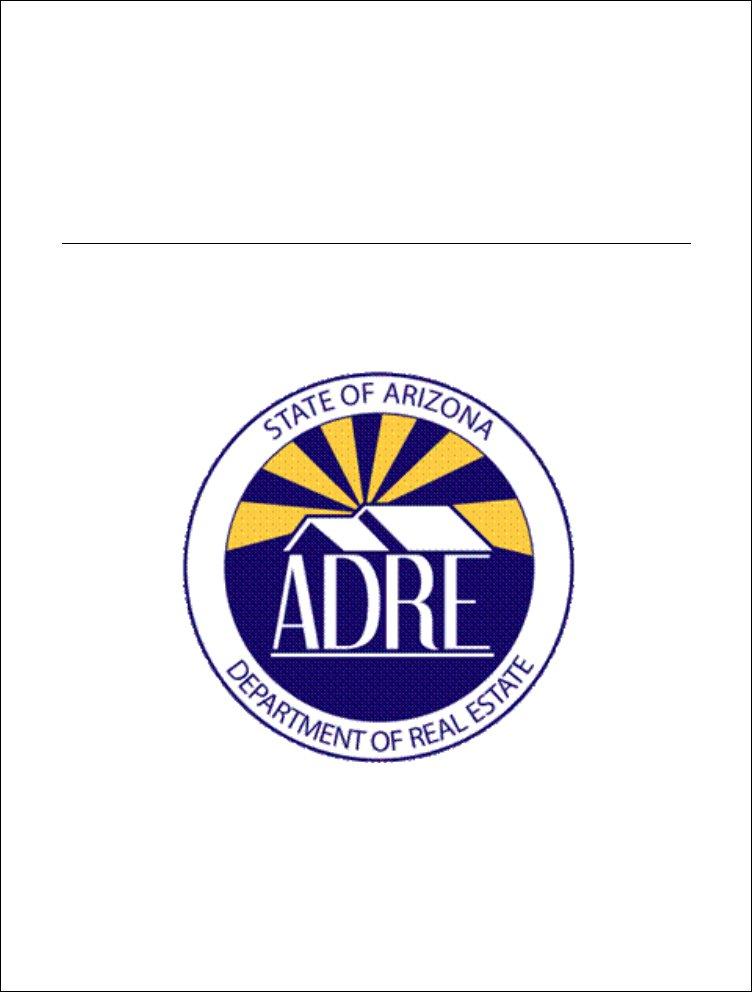In an ever-evolving real estate market, the Arizona Department of Real Estate's Model Broker’s Policy and Procedures Manual, revised in January 2018 under the auspices of Governor Douglas A. Ducey and Commissioner Judy Lowe, serves as an essential guide for brokerages aiming to align their operations with state requirements. This comprehensive document, not to be directly adopted as a broker's manual but used as a foundational model, aims to equip brokers with the necessary structure to craft their own policies and procedures, covering a broad spectrum of brokerage operations. From defining ADRE requirements, delineating office and company policies, to addressing advertising regulations, affiliated business agreements under RESPA, agency relationships, compensation, and commission disputes, the manual spans the critical aspects of real estate brokerage management. It goes beyond these fundamentals to touch upon annual and deferred commissions, data security, disclosure policies, fair housing, and even the nuanced responsibilities brokers have towards clients and non-clients alike. Furthermore, the manual delves into operational specifics such as employee management, independent contractor agreements, and the use of electronic digital signatures, acknowledging the modern challenges and technological advances in real estate transactions. It also underscores the importance of adherence to anti-trust compliance and equal opportunity employment, reinforcing the ethical foundation upon which brokerages should operate. Given the manual’s comprehensive nature and the disclaimer highlighting the dynamic nature of laws and regulations, it’s clear that the onus rests on brokers to stay informed and adapt their policies accordingly to maintain compliance and uphold high standards of professional conduct.
| Question | Answer |
|---|---|
| Form Name | Broker Policy Manual Form |
| Form Length | 34 pages |
| Fillable? | No |
| Fillable fields | 0 |
| Avg. time to fill out | 8 min 30 sec |
| Other names | broker policy procedure, florida real estate office policy manual, broker office policies manual, az broker policy manual |

Arizona Department of Real Estate
Model Broker’s Policy and Procedures Manual
Douglas A. Ducey
Governor
Judy Lowe
Commissioner
Revised January 2018

ADRE Model Broker’s Policy and Procedure Manual
|
Page Numbers |
Table of Contents |
|
Introduction |
4 |
Notice of Disclaimer |
4 |
Definitions |
5 |
ADRE Requirements |
6 |
Office Policy Manual |
6 |
Company Policies |
7 |
Advertising |
7 |
Affiliated Business Agreement (ABA) – RESPA |
8 |
Agency Relationships |
8 |
Annual 1099 Reporting |
9 |
9 |
|
Commissions / Compensation |
9 |
Commission Disputes |
10 |
Collection of Commissions |
11 |
Compensation Agreement |
11 |
Referral and Finder Fees |
11 |
Deferred Commissions |
12 |
Shared Commissions Between Licensees |
12 |
Company Compensation Schedule |
12 |
Out of State/Out of Area |
12 |
Commercial Leasing |
13 |
Data Security |
13 |
Disclosure Policy and Documents |
13 |
Affidavit of Disclosure |
13 |
Buyer Advisory |
13 |
14 |
|
Pool Barriers |
14 |
Page 1 of 33

Sellers’ Property Disclosure |
14 |
Duties to Clients and Customers |
15 |
Duty to Deal Fairly – Obligations to Customers in Transaction |
15 |
Customer Care (Duties to Client and |
17 |
Representing Clients |
17 |
Client Contact and Appointments |
17 |
Obligations to the |
17 |
Electronic Digital Signature |
18 |
Employees (Office Staff) |
18 |
Equipment |
18 |
Equal Opportunity Employer |
18 |
Fair Housing |
19 |
Harassment |
19 |
Independent Contractor vs. Employees (Agreement) |
19 |
Insurance |
20 |
Automobile |
20 |
Errors and Omissions Insurance |
20 |
Health and Life Insurance |
21 |
General Liability Insurance |
21 |
Licensee Activity |
21 |
Address Changes |
21 |
Alcohol/Illegal Drug Use |
21 |
Areas of Expertise and Unauthorized Activities |
21 |
Disputes between Licensees |
22 |
Earnest Money |
22 |
Hiring/ Severing |
23 |
Licensee Expenses |
23 |
License Renewals |
23 |
ADRE license renewal information |
23 |
Leases |
23 |
Page 2 of 33

Listings |
24 |
Multiple Listing Service (MLS) Other Listing Websites |
24 |
Offer / Multiple Offers |
24 |
Open Houses |
24 |
Personal Safety |
24 |
Prospecting |
24 |
24 |
|
Professional Affiliations |
25 |
Sales Financing Alternatives |
25 |
Signs |
25 |
Special Programs |
25 |
Submission of Documents |
25 |
Teams |
26 |
Termination Policy |
26 |
Unlicensed Assistants |
27 |
Vacations/Out of Town |
28 |
Maintenance of Transaction Files |
28 |
Property Management |
30 |
Sales |
31 |
Transaction Management |
31 |
Trust Accounts |
32 |
Weapons |
33 |
Wire Transfer Fraud |
33 |
Page 3 of 33

ADRE Model Policy and Procedure Manual
INTRODUCTION
The ADRE Model Broker’s Policy and Procedure Manual (“Manual”) has been developed to provide a model for the broker's written policies and procedures required by A.A.C.
This Model Policy and Procedures Manual is not intended to serve as the final Broker Policy and Procedures Manual, or tell a broker how to run the broker's office, but is a starting point for a broker to convey to licensed and unlicensed persons in the broker's employ how that broker operates their business, and the manner in which the broker expects salespersons and associate
brokers to handle the
manual as a guide to create a manual that brings the broker into compliance with the rule which requires a written policy
The Manual is intended to serve as a model only, and the broker may choose to adopt any portion of the Manual that is relevant to their brokerages. The ADRE Model Broker’s Policy
Manual is not intended to be used as a broker’s policy and procedures manual.
Notice of Disclaimer
The requirements set forth in this model are based upon a practical application of Arizona laws, Commissioner’s Rules, Substantive Policy Statements and custom, and are not intended to provide legal advice. Laws, Commissioner’s Rules, Substantive Policy Statements, forms,
custom and requirements referenced in this manual may change. Neither the Real Estate Commissioner, nor any division, officer or employee of the Department of Real Estate warrants the accuracy, reliability or timeliness of any information in this model manual, and will not be responsible or liable for any loss, consequence, or damage resulting directly or indirectly from reliance on the accuracy, reliability, or timeliness of the information. Information in this model may have been derived from or repeated from other sources and may be applicable or not. The documents and materials found or referenced here may have been revised or replaced since the last printing of this model manual. Any person or entity that relies on information obtained from this manual does so at their own risk. The user assumes the risk of verifying any materials used or relied upon herein.
The Company (Employing Broker) and/or Designated Broker is responsible for the acts of all licensees and other employees acting within the scope of their employment
(A.A.C.
Page 4 of 33

DEFINITIONS
Definitions of many terms are found in the Real Estate Law Book. In addition to terms defined in A.R.S. §
A.A.C. - Arizona Administrative Code (unofficially, the Commissioner's Rules)
AAR - Arizona Association of REALTORS®
ADRE - Arizona Department of Real Estate
A.R.S. - Arizona Revised Statute
AMA – Arizona Multihousing Association
Associate Broker – A licensed broker employed by another broker. Unless otherwise specifically provided, an associate broker has the same license privileges as a salesperson.
AZREEA – Arizona Real Estate Educators Association
Broker – A company’s designated broker
Company – (Company name here)
D.B.A./dba – Doing Business As name
Designated Broker – The natural person who is licensed as a broker under Title 32, Chapter 20, and who is either: designated to act on behalf of an employing real estate, cemetery or membership camping entity, or doing business as a sole proprietor, pursuant to A.R.S. § 32- 2101(A)(21).
Employing Broker – A person who is licensed or is required to be licensed as a broker entity pursuant to A.R.S. §
Licensee – A person to whom a license for the current license period has been granted under any provision of Title 32, Chapter 20.
Listing – An employment contract to represent a seller in the marketing of the seller’s
property.
Buyer Broker Agreement – An employment contract to represent a buyer in the intended purchase of property.
MLS – local multiple listing service
NAR – National Association of REALTORS®
NARPM – National Association of Residential Property Managers®
RESPA – Real Estate Settlement Procedures Act
Page 5 of 33

Sales Associate - A licensed salesperson or associate broker working with the company as either an employee or an independent contractor.
SPDS - Seller's Property Disclosure Statement
SPS – ADRE Substantive Policy Statement
ULI – Urban Land Institute
ADRE REQUIREMENTS
Office Policy Manual
Effective August 6, 2002, Commissioner's Rule
1.Review and manage transactions requiring a salesperson’s or broker’s license; and use of disclosure forms and contracts and if a real estate broker, this includes real estate employment agreements under A.R.S. §
2.Manage the filing, storing, and maintenance of transaction documents that may have a material effect upon the rights or obligations of a party to a transaction, handling of trust funds, and use of unlicensed assistants by a salesperson or broker.
3.Oversee delegation of authority to others to act on behalf of the broker.
4.Familiarize salespersons and associate brokers with the requirements of federal, state, and local laws relating to the practice of real estate (or the sale of cemetery property or membership camping contracts, if applicable).
5.Review and inspect documents that may have a material effect upon the rights or obligations of a party to a transaction, and advertising and marketing by the employing broker and by all salespersons, associate brokers, and employees of the broker.
6.A Designated Broker shall establish a system for monitoring compliance with statutes, rules and the Employing Broker’s policies, procedures and systems.
7.A Designated Broker is responsible for the acts of all associate brokers, salespersons, and other employees acting within the scope of their employment.
8.If an Employing Broker maintains one office, and employs a Designated Broker, no more than one other licensed person, and no more than one unlicensed person, the Employing Broker and Designated Broker are not required to develop and maintain written policies, procedures, and systems as described herein.
Page 6 of 33

9.Licensees are obligated to remain licensed, abide by all laws and rules and abide by the broker’s policies and procedures.
10.It shall be the responsibility of the broker, when out of the office for
COMPANY POLICIES
Advertising
This section should cover all advertising media, including the Internet; websites, blogs, and social media.
Review of advertising for Fair Housing compliance and use of the Fair Housing logo.
Review of advertising for compliance with federal regulations, ie. Regulation Z and Truth in Lending laws.
Set standards for social media and advertising.
A salesperson or broker shall ensure that all advertising identifies in a clear and prominent manner the employing broker’s legal name or the dba name contained on the employing broker’s license certificate., see
All advertising, including, but not limited to, Facebook, Linkedin, InstaGram, and other forms of social adverting must contain the name of the Employing Broker in the advertising.
Broker review before placement of advertising.
A.A.C.
A licensee shall not advertise property in a manner that implies that no salesperson or broker is taking part in the offer for sale, lease, or exchange.
A licensee advertising their own property for sale, lease, or exchange shall disclose the licensee’s status as a salesperson or broker, and as the property owner, by placing the words “owner/agent” in the advertisement.
A licensee shall ensure that all advertising contains accurate claims and representations, and fully states factual material relating to the information advertised. A licensee shall not misrepresent the facts or create misleading impressions.
Pursuant to
O Note that the Commissioner’s Rule references “employing broker’s license certificate”, however license certificates are no longer issued by the Department.
Arizona real estate licensees can locate their license record on the Online Public Database, click here.
Page 7 of 33

A licensee who advertises property that is the subject of another person’s real estate employment agreement shall display the name of the listing broker in a clear and prominent manner.
Before placing or erecting a sign giving notice that a specific property is being offered for sale, lease, rent, or exchange, a licensee shall secure the written consent of the property owner, and the sign shall be promptly removed upon request of the property owner.
The licensee acknowledges that the use of an electronic medium, such as the Internet or website technology, that targets residents of this state with the offering of a property interest or real estate brokerage services pertaining to property located in this state, constitutes the dissemination of advertising as defined by A.R.S. §
Affiliated Business Agreement (ABA) – RESPA
This section should include:
Identification of relationships the Company has established with other companies that require disclosure under the Real Estate Settlement Procedures Act (RESPA) and the form that is required for disclosure.
The Company policy concerning licensee referrals made to clients or customers, requirement of brokers signature on all forms, including any required disclosure of compensation.
When the disclosure of a relationship is required.
Whether individual licensees can enter into ABAs or whether this right is reserved solely to the Company.
Consumer Financial Protection Bureau (CFPB) RESPA Information, click here
Agency Relationships
This section should clearly describe the Company’s policy on agency and disclosure and/or the consent forms to be used. The following are examples of different forms of agency a company may implement:
The Company represents the seller/landlord exclusively when the Company is the listing agent, but not the selling/leasing agent.
The Company represents the buyer/tenant exclusively when the Company is the selling/leasing agent, and not the listing agent.
The Company represents both the seller/landlord and buyer/tenant as a dual agent (Limited Representation Disclosure Form required) when there is only one licensee or two licensees from the same Company.
Agency is established with the broker, not the Sales Associates.
The Company will cooperate with a selling/leasing agent from another brokerage that represents the seller/landlord exclusively, or represents the buyer/tenant exclusively.
The Company Does or Does Not allow
Page 8 of 33

Pursuant to A.R.S.
In transactions involving a commercial lease, representation must be identified and documented as early in the negotiations as possible.
Annual 1099 Report and Tax Compliance
This section should cover:
What IRS and Arizona Department of Revenue (ADOR) forms should be used, and who is responsible for tax liabilities and/or deductions identified by the Employing Broker.
∙Who will issue the Independent Contractor 1099 Forms each year?
∙Contact information for IRS and ADOR.
∙Include information from ADOR about registering for Transaction Privilege Tax, if applicable.
∙Whether IRS 1099 Forms will be issued to referral brokers, and other recurring payments and who is responsible for issuing the forms.
This section should include:
Compliance with the
Caution regarding the distribution of listings exclusively to select and/or closed groups of individuals.
Federal Trade Commission, click here
Commissions / Compensation
Compensation means any fee, commission, salary, money, or other valuable consideration for services rendered, as well as, the promise of consideration whether contingent or not.
(A.R.S. §
This section should cover:
Payment of Commissions
Only licensees can be paid a commission through their employing broker.
Refer to SPS 2005.08 regarding payment of commission after license expiration or transfer of employment, click here.
Commissions are paid to the licensee in accordance with the licensee’s commission agreement with the Company.
Page 9 of 33

When the Designated Broker of the Company will authorize the escrow company to pay commissions on each specific transaction, directly to the licensees on the broker’s behalf. Only the Designated Broker shall give written authorization to escrow on all splitting, and/or payments of commissions.
O Upon direction in writing on each individual transaction, commission checks should be delivered by escrow directly to the Employing Broker along with the closing statement, for Designated Broker verification and documentation.
What fees will be deducted from the commission, i.e., Errors and Omissions Insurance (E&O).
What date determines which month the transaction closes, and when commission is earned?
If commission checks received need to clear the bank before payment to the licensee is made.
Time from delivery of checks from escrow to delivery of check to licensees.
Whether Employing Broker allows “Commission Advances”. If so, under what terms and processes, including requirement for Designated Broker signature.
Pursuant to A.R.S.
A broker shall employ and pay only active licensees.
A licensee shall accept employment and compensation as a licensee only from the legally licensed broker to whom the licensee is licensed.
If the licensee is licensed through a professional corporation (PC) or a professional limited liability company (PLLC), the employing broker may pay the licensee, and the licensee may receive compensation only through the licensed professional corporation (PC) of which the licensee is an officer and shareholder, or the licensed professional limited liability (PLLC) company of which the licensee is a member or manager.
Note: The PC or PLLC must not pay any licensee other than the licensees named as members of the PC or PLLC. A real estate PC or PLLC is a corporation registered with the Arizona Corporation Commission, and licensed with ADRE.
Refer again to SPS 2005.08 relating to payment of commission after license expiration or transfer of employment, click here.
When a real estate licensee has rightfully earned a commission while in the employee of a broker, and in accordance with their agreement, that broker shall pay the licensee, even though the licensee may have left the employ of that broker.
Commission Disputes
This section should cover:
How commission disputes between licensees under the Employing Broker are to be handled;
Page 10 of 33

OWhether there must be a written agreement, and what happens when there isn’t;
OWill there be an internal arbitration process; and
OWhether the broker will mediate or arbitrate the matter.
Who pays expenses if unauthorized actions are taken outside of the policy, and what are the consequences.
Pursuant to A.R.S. §
Collection of Commissions
This section should cover:
Costs of recovering any commissions, and who pays for the costs (ie. Company, licensee, or another party).
Division of any forfeited earnest money deposit.
Reduction of commission negotiated by the licensee, permissions required, etc.
Compensation Agreement
This section should cover:
Licensee compensation - any deduction from commission shall be itemized.
Compensation paid after termination.
How bonuses are to be paid and divided.
How broker will compensate out of MLS area licensees and brokers when accepted offers are presented by an out of MLS area licensee.
Commission/compensation agreements must be in writing with specificity of the form to be used.
Referral and Finder’s Fees
This section should cover:
Outgoing referral fees must be paid only to a licensed Employing Broker/Company.
For
No fees shall be paid to unlicensed persons or entities.
How incoming referral fees are handled.
OReferral fees are payable only to the Company.
OIf and how referral fees will be split with the Company.
OWhether a form is required to be used with either incoming or outgoing referrals and whether it must be signed by all Designated Brokers involved.
Whether the Company pays finder fees in the form of a credit or reduction in monthly rent to unlicensed tenants of apartment complexes (A.R.S. §
O If so, the amount allowed, and forms to use. O If any signature of authorization is required.
Page 11 of 33

Deferred Commissions
This section should cover:
If Employing Broker allows deferred commissions.
How any deferred commissions received will be paid to sales associates.
If a beneficial interest can be assigned to a sales associate and under what circumstances.
How assigned commissions are handled with regard to the Internal Revenue Service,
Form 1099’s. etc.
Shared Commissions Between Licensees in Same Company
This section should cover:
Only the Designated Broker shall pay licensees in the Company.
How shared commissions will be handled.
Types of agreements that are drawn.
Whether broker approval is required.
What happens if a commission is shared without broker approval? O Are verbal agreements allowed, etc.
Shared commissions and referral fees paid to someone outside the Company are to be paid by the Company to the outside Company, not by any licensee to a licensee.
Company Compensation Schedule – Rate Schedules
Determined by each broker independently, this section should cover:
Compensation splits;
Errors and omissions insurance deductions, if any, and whether they are related to the licensee’s compensation level;
Compensation paid after termination;
Division of bonus payments;
Any minimum acceptable cooperating commission without prior approval of the Designated Broker when representing buyers;
Any minimum acceptable listing commission without prior approval of the Designated Broker;
How any bonuses are to be paid;
Whether amounts owed to the Company by the licensee will be deducted from the commission by the Company.
Out of State/Out of Area
This section should cover:
How brokers will cooperate and compensate out of MLS area brokers when offers are presented.
O All payments shall go to the cooperating Employing Broker.
How will commissions be handled?
Page 12 of 33

Commission agreements must be in writing.
Compliance with A.R.S. §
Commercial Leasing
Brokers must make sure all parties of the transaction know who represents them (or doesn’t) and document as early in the negotiation as possible.
Pursuant to A.R.S. §
Data Security
This section should cover:
OHow Company will protect and secure the personal information of licensees and clients within the Company.
OSpecific instruction on how licensees should communicate personal information to others, i.e., proof of funds, leases, earnest money checks, etc.
OPhysical Documents – How licensees should handle the storing and confidentiality of documents.
OHow documents will be handled and stored to preclude any unauthorized
Electronic Files
ORequirements that personal information kept in electronic format must be stored in a computer and/or electronic server that is password protected, and backed up.
Document retention and destruction
OHow and when documents containing personal information will be destroyed and/or deleted, unless required to be retained by law or broker policy.
Disclosure Policy and Documents
This section should cover:
Affidavit of Disclosure
For transactions involving 5 (five) or fewer parcels located in an unincorporated area, should include the use of the Affidavit of Disclosure, pursuant to
A.R.S. §
Buyer Advisory
Whether, or under what circumstances, licensee should use a Buyer Advisory O If so, form to be used and process, timing, etc., i.e., click here
Page 13 of 33

The requirement by the U.S. Department of Housing and Urban Development (HUD) requires that every seller or lessor of residential property built prior to 1978 disclose to the potential buyer/tenant the possibility for, or the existence of
That every buyer/tenant is to receive a copy of the pamphlet “Protect Your Family from Lead in Your Home”. Also that every buyer/tenant receive the
Paint Disclosure Addendum, available at ADRE’s website.
HUD – Protect Your Family From Lead In Your Home, click here
HUD – About
OBuyer initials or signatures are required to acknowledge receipt of notice.
OBuyer initials or signatures are required to acknowledge receipt of notice.
OSales Associates are required to initial and sign the receipt.
Pool Barriers
Whether a local pool barrier disclosure is required, if so, the required form.
Ensuring that the seller complies with provisions of A.R.S. §
AZDHS – Residential Pool Safety Notice, click here
Seller Property Disclosure
Whether the Company requires all sellers to complete a Seller Property Disclosure on every listing. If so, any exception i.e., perhaps for new construction not complete at time of listing, estate sales,
How the licensee is to handle any questions that are not answered, appear to be inaccurate, inconsistencies and red flags, or if the seller refuses to complete a Seller Property Disclosure.
Which form to be used for the Seller Property Disclosure.
Page 14 of 33

Duties to Clients and Customers
Fiduciary Duties to the Client
This section should include:
OThe broker’s and licensee’s responsibilities when acting as agent for a client.
ODuties of confidentiality, accountability, reasonable skill and care, loyalty, obedience (lawful), accounting and disclosure.
Duty to Deal Fairly – Obligations to Customers in the Transaction
This section should include:
Pursuant to A.A.C.
∙A licensee owes a fiduciary duty to the client and shall protect and promote the client’s interests.
∙The licensee shall also deal fairly with all other parties to a transaction.
∙A licensee participating in a real estate transaction shall disclose in writing to all other parties, any information the licensee possesses that materially or adversely affects the consideration to be paid by any party to the transaction, including:
1.Any information that the seller or lessor is or may be unable to perform;
2.Any information that the buyer or lessee is, or may be, unable to perform;
3.Any material defect existing in the property being transferred; and
4.The existence of a lien or encumbrance on the property being transferred.
∙A licensee shall expeditiously perform all acts required by the holding of a license. A licensee shall not delay performance, either intentionally or through neglect.
∙A licensee shall not allow a controversy with another licensee to jeopardize, delay, or interfere with the initiation, processing, or financing of a transaction on behalf of a client. This prohibition does not obligate a licensee to agree to alter the terms of any employment or compensation agreement or to relinquish the right to maintain an action to resolve a controversy.
∙A licensee shall not act directly or indirectly in a transaction without informing the other parties in the transaction, in writing and before the parties enter any binding agreement, of a present or prospective interest or conflict in the transaction, including that the:
1.Sales Associate has a license and is acting as a principal;
2.Purchaser or seller is a member of the salesperson’s, broker’s, or designated broker’s immediate family;
3.Purchaser or seller is the salesperson’s or broker’s employing broker, or owns or is employed by the salesperson’s or broker’s employing broker; or
4.Salesperson or broker, or a member of the salesperson’s or brokers immediate family, has a financial interest in the transaction other than the salesperson’s or broker’s receipt of compensation for the real estate services.
Page 15 of 33

∙A licensee shall not accept compensation from or represent more than one party to a transaction without the prior written consent of all parties.
∙A licensee shall not accept any compensation, including rebate or other consideration,
directly or indirectly, for any goods or services provided to a person if the goods or services are related to or result from a real estate transaction, without that person’s prior written acknowledgement of the compensation.
∙The services that a licensee provides a client or a customer shall conform to the standards of practice and competence recognized in the professional community for the specific real estate discipline in which the salesperson or broker engages.
∙A licensee shall not undertake to provide professional services concerning a type of property or service that is outside of the licensee’s field of competence without engaging
the assistance of a person who is competent to provide those services, unless the licensee’s lack of expertise is first disclosed to the client in writing and the client subsequently employs the licensee.
∙A licensee shall exercise reasonable care in ensuring that the licensee obtains information material to a client’s interests and relevant to the contemplated transaction and accurately
communicates the information to the client. A licensee is not required to have expertise in subject areas other than those required to obtain the salesperson’s or broker’s license.
∙A licensee shall take reasonable steps to assist a client in confirming the accuracy of information relevant to the transaction.
∙A licensee shall not:
1.Permit or facilitate occupancy in a person’s real property by a third party without prior written authorization from the person; or
2.Deliver possession prior to closing unless expressly instructed to do so by the owner of the property or property interest being transferred.
∙A licensee shall recommend to a client that the client seek appropriate counsel from insurance, legal, tax, and accounting professionals regarding the risks of
Pursuant to A.A.C.
∙Upon execution of any transaction document a licensee shall, as soon as practical, deliver a legible copy of the signed document and final agreement to each party signing the document.
∙During the term of a listing agreement, a licensee shall promptly submit to the licensee’s client all offers, whether verbal or in writing, to purchase or lease the listed property.
Page 16 of 33

∙Upon receiving permission from the seller or lessor, the licensee acting on behalf of the seller or lessor may disclose to all offerors or their agents the existence and terms of all additional offers on the listed property.
∙The licensee shall submit to the client all offers made prior to closing and is not released from this duty by the client’s acceptance of an offer unless the client instructs the licensee in writing to cease submitting offers or unless otherwise provided in the listing agreement, lease, or purchase contract. The licensee may voluntarily submit offers to the seller or lessor regardless of any limitations contained in the listing agreement and may submit offers after the listing agreement is terminated.
Customer Care (Duties to Clients and
Representing Clients
This section should cover:
What the licensee’s responsibilities are when acting as an agent, to be present during all showings, inspections, document signings, and escrow closings.
What the licensee’s responsibilities are to keep clients informed.
Whether these responsibilities are required in new home searches and transactions.
Client Contact and Appointments
This section should cover:
Expectations with regard to professional courtesies.
How difficult relationships should be handled and whether and under what conditions clients may be reassigned by the Broker to another licensee.
How the licensee should handle the inability to keep an appointment.
Obligations to the
This section should include:
The broker’s/licensee’s obligation to disclose in writing to all other parties:
OAny information that materially and adversely affects the consideration to be paid by any party to the transaction.
OThat the seller/lessor is, or may be, unable to perform.
OThat the buyer/lessee is, or may be, unable to perform.
OAny material defect existing in the property being transferred.
OThe possible existence of a lien or encumbrance on the property being transferred.
OThat the broker/licensee is the principal or has a financial or beneficial interest in the property.
OThat the broker/licensee is related to one of the principals.
OThat the broker/licensee has a conflict of interest.
Page 17 of 33

Electronic Digital Signature
What electronic/digital signature companies are used.
Employees (Office Staff)
This section should cover:
Benefits
Insurance
Paid Time Off
Holidays
Enforced Absences, i.e., Jury Duty, Military service
Office Hours
Personnel Files
Salary and Wage Policy
Payment of Salaries/Wages
Payroll Deductions
Performance Review
Disciplinary Action
Harassment Policy
Unlicensed Assistant Policy
All Employer/Employee Disclosures/Disclaimers
Equipment
This section should include:
What security measures must be taken.
Who is allowed to use company computers.
What can the computers be used for, i.e., business vs. personal – sharing of passwords.
Does the company have email service, or are licensees responsible for their own email service.
Does the company have a policy on the name of email service to be used, i.e., the use of a trademark, ie. “REALTOR®”.
How is the
Equal Opportunity Employer
This section should include:
An affirmative statement concerning equal opportunities at the Company
Page 18 of 33

Fair Housing
This section should include:
A statement concerning compliance with State and Federal Fair Housing Acts.
Clear instructions on compliance with the State and Federal Fair Housing Laws.
A licensee shall not discriminate against a person for race, color, religion, sex, national origin, disability, or familial status.
A licensee shall not make, print or publish any notice, statement or advertisement with respect to the sale or rental of a dwelling that indicates any preference limitation or discrimination based on race, color, religion, sex, handicap, familial status, or national origin.
Note that real estate licensees affiliated with a trade association may be bound to additional guidelines or considerations.
Examples of where to find Fair Housing laws and rules:
∙HUD - Fair Housing Act, Click here
∙Arizona Attorney General - Fair Housing (Housing Discrimination), Click here
Harassment
This section should include:
A statement that is consistent with the Company’s commitment to provide equal employment opportunities. The Company will not tolerate any form of harassment, including sexual harassment or harassment on the basis of age, disability, race, national original, religion or any other protected class or category.
How harassment claims should be reported.
How harassment claims will be investigated or handled.
Independent Contractor or Employee (Agreement)
This section should include;
The licensee’s standing as an Independent Contractor or Employee; including types of activities that may affect the licensee’s standing as perceived by the Internal Revenue Service, Arizona Department of Revenue or the Arizona State Compensation Fund.
Whether a written Independent Contractor Agreement (ICA) with the Company is required.
NOTE: For federal tax purposes, the Internal Revenue Code (I.R.C. §3508) provides a statutory
classification for qualified real estate licensees that allows their treatment as
Page 19 of 33

1.Be licensed as a real estate agent;
2.Receive substantially all compensation based on sales or other output, rather than the number of hours worked;
3.Have a written contract with the brokerage firm that provides that the licensee will not be treated as an employee for federal tax purposes; and
4.If a broker’s agents are independent contractors, licensees cannot be required to perform any duties, obligations or have any responsibilities, per company policy, that are not required by law.
Insurance
This section should include:
Automobile
Who is responsible for providing transportation, and who pays expenses
The Company’s minimum insurance requirements and what the limits of coverage are
Any indemnification/hold harmless clauses the Employing Broker may require
Company requirements, if any, to be an additional insured on licensee’s policy
Company’s requirements, if any, for higher limits or additional coverage if clients are in the vehicle
Errors & Omissions (E&O) / Complaints
Who is responsible for paying the premiums or, if
Licensee should be cautioned that there are circumstances where E&O may not provide coverage, i.e., intentional misrepresentation, fraud, commercial environmental issues, transactions where licensee acts as a principal.
Does the Company’s E&O coverage include licensee owned properties?
What are the requirements for coverage, what type of property does this include (residential, land, commercial, property management, business opportunities). Is there a difference in the fee and who is responsible for payment?
Does Company’s E&O coverage include unlicensed assistants hired by other than Employing Broker?
What are the legal and complaint procedures with regard to the following:
OClient/customer complaint letters
OAttorney letters
OProduction of letters for subpoenas
OLawsuit subpoena
OADRE complaints
OIRS revenue tax levy
OJudgments/garnishments
The following should be included:
Page 20 of 33

OClaims or litigation
OE&O insurance license agreement
OIndemnification from licensee
OSeverance from Company
Health and Life Insurance
Who will be financially responsible for the licensee’s health and life insurance
General Liability Insurance
The brokerage position concerning General Liability Insurance for licensees
Should licensees carry individual coverage, and if so, how much
If the Company permits property management, does the Company require liability insurance from owner – should the Company be listed as additional insured.
Licensee Activity
This section should include licensee issues relating to office affiliation:
Address Changes – Personal Information
Brokers and licensees must notify ADRE within
Broker requirements for being notified of the above.
The Broker must notify ADRE of any change or abandonment of a business location within ten days, pursuant to
Alcohol/Illegal Drug Use
Company policy regarding alcohol in the workplace or Company sponsored activities
Prohibition against illegal drug use
Company policy regarding use of medical marijuana
Areas of Expertise and Unauthorized Real Estate Activities
What is the Company position on working outside of area of expertise?
What does Company require as far as education for areas of expertise, or designation, if any, i.e., CCIM for commercial
Does Company allow its licensees to be principals in separate LLC’s for working as a vendor on properties. If so, what are disclosure requirements to the Company and to consumers.
Company policy regarding areas of practice that licensees are not authorized to participate in without prior approval of the broker, for example;
Page 21 of 33

OSales, leases, exchanges and property management, commercial, industrial,
OShort sale
OREO or bank owned
OBusiness opportunities
OFHA or VA owned properties
O
OUnsubdivided lands
OLicense selling/leasing/buying own real estate – fix and flip
OContracts allowing for assignment during escrow period
Pursuant to A.A.C.
competence without engaging the assistance of a person who is competent to provide those services, unless the licensee’s lack of expertise is first disclosed to the client in writing and the
client subsequently employs the licensee.
Disputes between licensees
Any written agreement or policy concerning how the dispute is to be resolved.
Whether the matter will be mediated or arbitrated, and if so, by whom.
If unable to mediate an acceptable resolution, who will determine the outcome.
What happens if a licensee refuses to cooperate or fails to comply with any ordered or agreed upon conduct or discipline.
Whether notice of a dispute must be given to the Employing Broker, including when and how such notice is to be provided.
If a lawsuit is filed, who is responsible for judgments, damages, losses, costs, expenses, etc., incurred by Employing Broker/Company in the defense of lawsuits
Consequences for
Earnest Money and Other Trust Monies
The amount and type of earnest money deposit must be clearly identified in the offer to purchase and shall be made payable, or wired to a specific escrow/title company or the Employing Broker trust account.
O No postdated checks can be accepted.
Removal of all personal account numbers and personal information from a check before forwarding a copy to a listing agent.
The receipt for earnest money from the escrow/title company, must be turned into the broker or the authorized branch manager immediately upon receipt.
All earnest money must be handled in accordance with the terms of the contract and according to ADRE statutes.
Company policy on retainer agreements and monies paid by client and monies held by Employing Broker.
When will monies held, if not refundable, be released to sales associate.
All refundable monies must be deposited to Employing Broker’s Trust Account
(not operating account).
Page 22 of 33

Notice that improper handling of earnest money may be grounds for immediate dismissal of a licensee. Improper handling of earnest money could include;
O Failing to deposit earnest money by the specified time O Commingling
O Falsely representing that earnest money has been deposited
Hiring/ Severing
A licensee is not effectively hired by a broker until the broker approves of the license transfer to Company via ADRE website.
A licensee may sever from Company without broker approval.
OWhat is required by the Company at the time of severance?
Licensee Expenses
E&O insurance
Automobile insurance
Office space & equipment (computers and software, phones, long distance calling, 800# service; postage, i.e., Fed Ex, UPS, USPS, fax, copiers, etc.
Clerical/assistant support
Advertising
Liability insurance
Taxes, FICA, etc.
Health insurance (availability of health or life insurance, possible sources)
License Renewals
What continuing education requirements are necessary?
License renewal period should be addressed.
Recommendations of education can be suggested, i.e., additional and specific CE or GRI, etc.
Reminder – only the licensee may complete their CE hours and upload to ADRE for license renewal.
ADRE license renewal information: Click here
Leases (See also Property Management)
Broker’s definition of property management
What are the broker’s requirements to allow a licensee to practice property management?
How to handle the leasing information (personal financial information) and the protection of that information
What documents are required for the broker file – where broker files are located
What disclosures should be made to the tenant
What forms should the licensee use
Company must have a clear policy regarding trust accounts, and the submission to the broker for the monthly trust account
Page 23 of 33

Listings
Deadlines for turning in paperwork for Designated Broker approval.
Any additional documents the Designated Broker requires.
Multiple Listing Service (MLS) / Other Listing Websites
Who is responsible for dues associated with listing websites and when are they paid.
What listing websites are used.
Offer / Multiple Offers
This section should include:
A description of how contracts are to be presented, and that they must be presented in a timely manner.
What will happen when licensee is not available and cannot timely present/respond to a contract.
How multiple offers should be handled
Open Houses
If Company open house signs must be used
If and under what circumstances licensees other than the listing agent can hold open houses
Any other policies regarding the operation of open houses, including safety procedures.
Personal Safety
Licensee personal safety
Company policies for safety
Building security/alarms/office closing procedures
Work injuries/hazardous conditions
Any
That licensees must recommend to their clients to seek appropriate counsel (including tax, legal, insurance, etc.) concerning risks associated with pre- possession or post possession
Whether Broker approval is necessary before
Page 24 of 33

Professional Affiliations
Whether membership in a business or trade association is required or recommended and if so, which associations or organization and who is responsible for dues or fees
Prospecting
Telemarketing – Do Not Call List
OBefore making calls to consumers do you or your company verify the number you’re calling is not registered on the National Do Not Call Registry? Here are some FAQ’s from the Federal Trade Commission (The government agency that protects consumers). More information is available with the FTC, click here.
ONote that the Arizona Office of the Attorney General also has telemarketing guidelines that must be adhered to, click here.
OFailure to follow guidelines could result in penalties.
Sales Financing Alternatives
The Employing Broker’s policy concerning an offer which proposes to wrap, carry, or subordinate a loan which contains alienation and acceleration clause.
What a licensee, whether a seller’s or buyer’s agent, should do when presented with or asked to draft an offer including one of these financing clauses and whether particular forms must be utilized.
Whether the Employing Broker requires a special review of the contract to see that proper form and verbiage have been used.
What are the consequences of a licensee proceeding with one of these contracts without first consulting the Designated Broker.
Signs
What are requirements for content on all signs
Any restrictions or policy about signs such as, signed authorization from owner prior to placing signs on property
Whether or not signs are provided by Company or licensee
Whether the Company handles sign installation or licensee
When signs are to be placed and removed
Special Programs
What training is required on government programs
Whether licensees are allowed to discuss programs with clients
Submission of Documents
ARS
Page 25 of 33

What is the policy of the Company regarding the timeframe for submission of all documents to broker – including Amendments and other contrast documents
Teams
Team name criteria to be approved by broker
“Teams” within the Arizona real estate industry are not officially recognized entities in Arizona Statues or Rule.
Broker’s policy concerning Teams, Personal Assistants (licensed or unlicensed)
Office space/equipment
Company liability
Permissible and prohibited activities
Compensation
OAll compensation for licensed Team members must be paid by the Employing Broker, (A.R.S. §§
OWithholding tax
OWorker’s compensation
OUnlicensed Assistants - Team leader supervision/responsibility and the broker
Licensees who elect to be a team shall draft an agreement between themselves
Licensees must include the terms of dissolution clearly spelled out in the agreement
What is the Company’s policy regarding the broker’s acknowledgment and approval of Team agreement between team members
ADRE does not monitor the status/classification of unlicensed assistants as independent contractor or employee with the IRS or Labor Board.
Termination Policy
What happens when a licensee terminates association with the Company
Review all the licensee’s pending business and determine who will handle the transactions
Requirements for agreement concerning compensation and assignment of escrow companies
Disposition of Company property upon the severance/termination of a licensee from the company including any keys, key cards, documents, proprietary/confidential materials, etc.
Company policy/practice concerning release or
Severance is not effective under licensing laws until the ADRE receives the notice of severance
Unlicensed Assistants
Does Company allow unlicensed assistants?
∙If so, under what conditions?
Page 26 of 33

∙Are agreements required?
∙Must broker review and sign agreements?
Review ADRE’s Substantive Policy Statement SPS No.
Description of Practice/Procedure: In looking at the issue of unlicensed assistants, various aspects must be considered, including what activities the individual will perform and how the individual is paid.
Definition: An Unlicensed Assistant is an unlicensed individual hired by an Arizona licensed real estate broker or salesperson as an assistant, who is not engaging in any activity for which a real estate license is required.
Definition: Compensation means any fee, commission, salary, money or other valuable consideration for services rendered or to be rendered as well as the promise of consideration whether contingent or not (A.R.S. §
An unlicensed assistant cannot be compensated on any basis that relies on the ultimate sale or closing of a property. The employing broker or designated broker is responsible for addressing in its written policies and procedures who is responsible for hiring and compensating unlicensed assistants. The employing broker is responsible for all activities of licensed individuals within the brokerage pursuant to Arizona Revised Statutes and
Rule. All inclusions of the unlicensed assistant in advertising or marketing must indicate the individual as being “unlicensed” (A.R.S. §
An unlicensed assistant may:
∙Under the direct supervision of an Arizona licensee, perform the following tasks, which include, but are not limited to:
OPersonal errands for the licensee
OClerical/administrative tasks including filing, copying, mailing, scanning, answering phones, forwarding calls or transcribing callers’ information for licensee
OUsing technology as a tool to complete tasks assigned by a licensee, which are not activities otherwise requiring a real estate license
OPreparing marketing materials approved by the Designated Broker
ODelivering documents
OAssist at an open house with a licensee present
OSet or confirm appointments for:
•A licensee to list or show property
•A buyer with a loan officer
•A property inspector to inspect a home
•A repair/maintenance person to perform repairs/maintenance
•An appraiser to appraise property
OTransmitting only instructions or information to clients, contractors, inspectors, appraisers and maintenance/repair people as completed and dictated by a licensee.
OUnlocking a home for a licensee so that the licensee can show a client the property or preview the property (No discussion about the property).
An unlicensed assistant shall not perform the following activities:
Page 27 of 33

OOriginate documents
OPerform a
OProvide advice, pricing, or opinions of value to a consumer
OProvide advice or negotiate with anyone regarding a property or transaction
OAssist in the preparation of documents with a consumer
OHold/host an open house without a licensee being present
OCollect or offers, attempts or agrees to collect rent for the use of real estate
OAssist or direct in the procuring of prospects calculated to result in the sale, exchange, leasing or renting of real estate pursuant to A.R.S.
A.R.S.
OAttend closing with a consumer without a licensee being present
An unlicensed assistant may transfer monies or be a signatory on a property management trust account only when the unlicensed assistant:
OIs in the direct employ of the broker, and
OIs a bona fide officer, member, principal or employee of the property management firm pursuant to A.R.S. §
A.R.S. §
An unlicensed assistant is otherwise not permitted to withdraw monies from the broker’s trust account.
Pursuant to A.R.S.
this chapter, other than a broker’s or salesperson’s license, without being licensed as prescribed by this chapter is guilty of a class 5 felony.
Vacations/Out of Town
What licensees are expected to do when they leave town, are on vacation, or unavailable.
Who is required to be notified?
Under what circumstances will the Company designate a substitute
Is a written agreement required when another licensee fills in?
Maintenance of Transaction Files
This section should include:
Any lists of documents required in transaction files, including sales, new home sales, land sales, listings, etc. This is a good place to establish checklists or references to the most current checklist required by the Company
Required timing for each document required, such as timing required to submit to the Designated Broker/manager for review and approval
What documents require broker’s initials or signature
How rejected offers are to be handled – must be turned in to Designated Broker, and retained by Designated Broker for one year.
Page 28 of 33

Whether listing agents are expected to verify listing information prior to submitting to MLS, or other online listing database
What documents are required in the file for cancelled transactions
How files involving a transaction where a licensee is a principal in the transaction are to be handled
Access to files – who has access and where files are to be kept
Pursuant to A.R.S.
The Designated Broker may implement any electronic real estate transaction management (TM) program for internal standardization of document storage, so long as the document storage program adheres to the guidelines mandated by statute, rules, and SPS 2010.01, click here.
The Employing Broker shall maintain each real estate purchase contract or lease agreement and
the transaction folder in which it is kept in a chronological log, or other systematic manner that is easily accessible by the commissioner or the commissioner’s representatives, and adhere to the
following:
Keep employment records, including copies of employment status, for all current and former employees.
Keep records of each transaction and all employment records for a period of at least five (5) years form the date of termination of the transaction or employment.
The records shall be open at all reasonable times for inspection by the commissioner or the commissioner’s representatives.
The records shall be kept in the employing broker’s principal office or licensed branch office in this state or at an
Keep copies of earnest money receipts, confirming that the earnest money has been handled in accordance with the transaction, closing statement showing all receipts, disbursements and adjustments, sales contracts and, if applicable, copies of employment agreements.
All licensees shall promptly place any cash, checks or other items of value received as payment in connection with a real estate transaction in the care of the Designated Broker or deposit to escrow company.
A broker shall not grant any person authority to withdraw monies from the broker’s trust fund account unless that person is a licensee under the broker’s license, (except as allowed by section
In addition to the requirements of A.R.S. §§
Page 29 of 33

delivered escrow closing statement that evidence all receipts and disbursements in the transaction.
Property Management
This section shall include:
∙Adhere to: all laws, regulations, and guidelines including
O The Arizona Residential Landlord Tenant Act; O Federal and state fair housing requirements; O County rental registration requirements; and
OLocal transaction privilege tax licensure and remittance requirements.
∙Broker approval: Licensees should have the Designated Broker’s written approval authorizing licensees to engage in property management. Designated Broker is responsible for all property management activities.
∙Education for Property Managers: Specific Property Management education is suggested for all licensees prior to engaging in property management.
∙Broker policy for Designated broker approved standard forms and clauses, including property management agreements, lease agreement, addendums, and landlord disclosures.
∙Security/Confidentiality: All files and accounting documentation must be secured, held confidential at all times (double lock system).
∙Record keeping: All files and accounting documentation are subject to internal and Department of Real Estate audits without notice.
∙ALTA: Strict compliance with the provisions of the Arizona Landlord/Tenant Act.
∙Disclosure for Agency: licensees must advise prospective tenants of the agency
relationship to the owner/landlord on any property managed, prior to showing the property. Disclosure(s) of agency shall be in writing and signed by all parties – designated form to be used.
∙Showing: A licensee should accompany all prospective tenants to properties . Under very rare circumstance, should a prospective tenant be given keys to or possession of a property without first being approved for occupancy under a fully executed rental or lease agreement.
∙Certain exemptions related to licensure requirements and performance bonus compensation for residential leasing agents or
All licensees working in the property management field should:
OHandle all funds as provided by statute (including trust accounts and security deposits).
OProtect personal information that comes into their possession.
OMaintain all required licenses.
All brokers should:
∙Review and approve all written property management agreements and assure regulatory compliance.
∙Approve all marketing and advertising material.
Page 30 of 33

The acceptance of cash for transactions is discouraged. A broker should have written policy when cash may be accepted.
Deposit of funds: All monies (checks, money orders, cashier’s checks) should be delivered to broker’s office immediately, or within 24 business hours. Please note that state law requires all
earnest money MUST be deposited next business day, and all other monies not subject to dispute (rents, etc.) MUST be deposited within 3 business days.
∙Licensee Personal Properties: Any transaction in which a licensee is a principal: a) must have broker’s prior written consent, b) NO MONIES for lease/rent of a licensee’s personal property can be in broker’s Trust Account c) ALL monies must be held by
principal or in a separate trust/fiduciary account. There shall never be any commingling of clients’ funds, i.e., no overdrawn balances.
(NOTE: i.e. - A separate account is required for any
∙Rental Application Policy and Credit Reports: Employing Broker should include rental application policies and, if credit reports are involved, policies must adhere to Federal Fair Credit Reporting Act. A licensee/property manager (whether an employee or independent contractor) should not be authorized to generate, review,
completed and credit reports run on every single applicant over the age of 18 for any rentals over 30 days – no variation or exceptions due to Fair Housing laws. The actual credit report can NEVER be given to anyone, including applicant or owner.
∙Security Deposits: Including pet deposit may not exceed
Sales
This section should include:
Transaction records for closed sales and leases must be kept for five (5) years
Records for transactions that are rejected must be kept for one (1) year (A.R.S. §
What records must be kept (including copies of earnest money receipts; closing statements showing receipts, disbursements, and adjustments; purchase and lease contracts, addenda, listing agreements)
In transactions where a binding contract results, the broker must also retain all prior rejected offers for at least five (5) years (A.R.S. §
Page 31 of 33

Procedures and timing for turning in documents to the broker
That the Designated Broker or authorized associate broker review each listing agreement, purchase or nonresidential lease agreement or similar instrument within ten business days of the date of execution, pursuant to A.R.S. § 32- 2151.01(G).
Additional requirements or documents that must be turned in prior to a licensee being paid a commission
Transaction Management
This section should include:
If Company uses a transaction management platform, identify how licensees and employees will use the platform.
Any specific procedures for utilizing Company transaction management (TM) platform or TM services
Trust Accounts:
This section should include:
Whether Company has a trust account
If Company maintains a trust account, what procedures should licensees follow to submit checks to trust account
Because of sensitivity of the handling of trust funds, it is recommended that the broker understand the information on the ADRE website –
Arizona Department of Real Estate – Auditing FAQs, click here
Pursuant to A.R.S. §
The broker shall make deposits to trust fund accounts by deposit slips. Receipts or other documents shall identify each transaction, the date and the amount of each deposit and the names of parties involved in the transaction represented by the deposit and monies shall be used only for the purpose of which the monies were deposited.
The broker shall retain a complete record of all monies received in connection with a real estate transaction in the main or branch office of the designated broker in this state or at an
A broker’s records shall be kept according to generally accepted accounting principles and shall include a properly descriptive receipts and disbursements journal and client ledger.
The broker shall keep any computerized records in a manner allowing reconstruction in the event of destruction of electronic data. The broker shall maintain a trust fund account bank
Page 32 of 33

reconciliation and client ledger balance on a monthly basis and shall remove any interest earned on a trust fund account at least once every twelve months.
A Designated Broker shall not permit advance payment of monies belonging to others to be deposited in the Designated Broker’s person account or to be comingled with personal monies. It is not considered comingling if, when establishing a trust fund account, a Designated Broker deposits monies not exceeding three thousand dollars ($3,000) to keep the account open or to avoid charges for an insufficient minimum balance.
Weapons:
This section should include:
A Company may want to include a weapons policy. However, notably, Arizona law permits private business owners to prohibit weapons from being brought onto their property, whether signs are posted or not. Failure to obey the request could result in a charge of trespassing.
Wire Transfer Fraud:
This section should include policies and procedures on the following:
Cyber Security
Prevention of Wire Fraud
Reporting Cyber Crime
Arizona Association of REALTORS® - Wire Fraud Advisory and Procedures, click here.
Thanks to Real Estate Industry Partners in Residential, Commercial, Property Management,
Land, and the Real Estate Educators for your time and commitment to updating the 2017
version of the ADRE Model Broker’s Policy and Procedures Manual.
Special thanks to Martha Appel, Holly Eslinger, Sue Flucke, Michael Hammond, Courtney
LeVinus, Nate Nathans, Jan Steward, A. Patrick Sheahan and Lisa Suarez
Revised January 2018
Page 33 of 33